Related Research Articles

Milk is a white liquid food produced by the mammary glands of mammals and the caecilian Siphonops annulatus. It is the primary source of nutrition for young mammals before they are able to digest solid food. Immune factors and immune-modulating components in milk contribute to milk immunity. Early-lactation milk, which is called colostrum, contains antibodies that strengthen the immune system and thus reduce the risk of many diseases. Milk contains many nutrients, including protein and lactose.
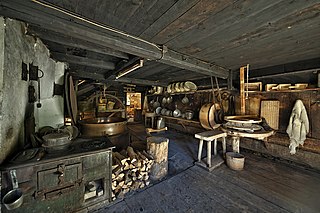
A dairy is a place where milk is stored and where butter, cheese and other dairy products are made, or a place where those products are sold. It may be a room, a building or a larger establishment. In the United States, the word may also describe a dairy farm or the part of a mixed farm dedicated to milk for human consumption, whether from cows, buffaloes, goats, sheep, horses or camels.

The Common Agricultural Policy (CAP) is the agricultural policy of the European Commission. It implements a system of agricultural subsidies and other programmes. It was introduced in 1962 and has since then undergone several changes to reduce the EEC budget cost and consider rural development in its aims. It has however, been criticised on the grounds of its cost, its environmental, and humanitarian effects.
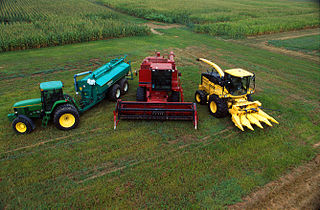
An agricultural subsidy is a government incentive paid to agribusinesses, agricultural organizations and farms to supplement their income, manage the supply of agricultural commodities, and influence the cost and supply of such commodities.
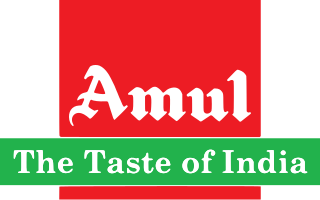
Amul is an acronym of the Indian Multinational cooperative society named Gujarat Milk Marketing Federation based in Anand, Gujarat. It is under the ownership of Gujarat Cooperative Milk Marketing Federation Limited, Department of Cooperation, Government of Gujarat. It is controlled by 3.6 million milk producers.
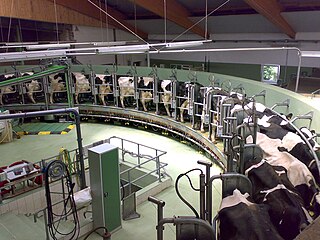
Dairy farming is a class of agriculture for the long-term production of milk, which is processed for the eventual sale of a dairy product. Dairy farming has a history that goes back to the early Neolithic era, around the seventh millennium BC, in many regions of Europe and Africa. Before the 20th century, milking was done by hand on small farms. Beginning in the early 20th century, milking was done in large scale dairy farms with innovations including rotary parlors, the milking pipeline, and automatic milking systems that were commercially developed in the early 1990s.

Fonterra Co-operative Group Limited is a New Zealand multinational publicly traded dairy co-operative owned by New Zealand farmers. The company is responsible for approximately 30% of the world's dairy exports and with revenue exceeding NZ $22 billion, making it New Zealand's largest company. It is the sixth-largest dairy company in the world as of 2022, as well as the largest in the Southern Hemisphere.
A marketing board is an organization created by many producers to try to market their product and increase consumption and thus prices. It can also be defined as an organization set up by a government to regulate the buying and selling of a certain commodity within a specified area. They most commonly exist to help sell farm products such as milk, eggs, beef or tripe and are funded by the farmers or processors of those crops or products. Marketing boards often also receive funding from governments as an agricultural subsidy. The leadership and strategies of the marketing boards are set through votes by the farmers who are members of the board.
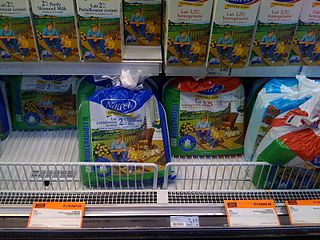
The Canadian Dairy Commission is an Ottawa-based Government of Canada Crown Corporation that plays a role of administrator, facilitator and stakeholder in the public policy related to the Canadian dairy industry. The CDC's mandate is to coordinate dairy policies in a jurisdiction that is shared between both provincial and federal governments. In the early 1970s, when the dairy industry became the first industry in Canada to be operated under the national supply management system, the CDC was named as facilitator and administrator coordinating dairy policies and providing a framework for the management of the Canadian dairy industry.
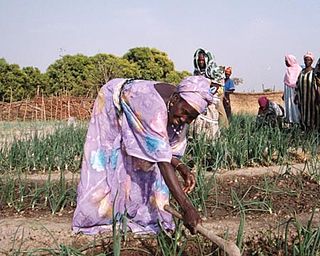
An agricultural cooperative, also known as a farmers' co-op, is a producer cooperative in which farmers pool their resources in certain areas of activities.
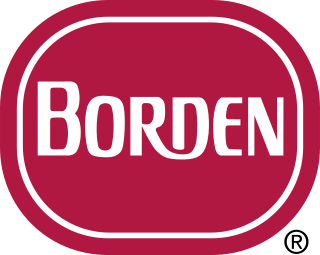
Borden, Inc., was an American producer of food and beverage products, consumer products, and industrial products. At one time, the company was the largest U.S. producer of dairy and pasta products. Its food division, Borden Foods, was based in Columbus, Ohio, and focused primarily on pasta and pasta sauces, bakery products, snacks, processed cheese, jams and jellies, and ice cream. It was best known for its Borden Ice Cream, Meadow Gold milk, Creamette pasta, and Borden Condensed Milk brands. Its consumer products and industrial segment marketed wallpaper, adhesives, plastics and resins. By 1993, sales of food products accounted for 67 percent of its revenue. It was also known for its Elmer's and Krazy Glue brands.
The 1933 Wisconsin milk strike was a series of strikes conducted by a cooperative group of Wisconsin dairy farmers in an attempt to raise the price of milk paid to producers during the Great Depression. Three main strike periods occurred in 1933, with length of time and level of violence increased during each one.
Marketing orders and agreements in United States agricultural policy allow producers to promote orderly marketing through collectively influencing the supply, demand, or price of a particular commodity. Research and promotion can be financed with pooled funds.
The Market Sharing Quota (MSQ), In Canadian agricultural policy, is the federally-determined target for the amount of industrial milk to produce nationwide each year as part of its policy of supply management. It is determined by estimating the domestic demand for dairy products on a butterfat basis, adding about 3% to cover exports and subtracting the volume of approved imports.
Dairyland is a dairy business that operates in Port Coquitlam, British Columbia. Now owned by Saputo Dairy Foods Canada, Dairyland was originally an operating arm of BC dairy farmers' cooperatives and was legally named Agrifoods International Cooperative Ltd. at the time of the sale of the majority of its assets to Saputo Incorporated. Its products are sold across Canada.
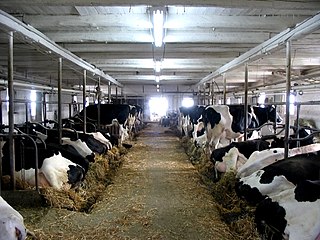
Dairy farming is one of the largest agricultural sectors in Canada. Dairy has a significant presence in all of the provinces and is one of the top two agricultural commodities in seven out of ten provinces.

Canada's supply management, abbreviated SM, is a national agricultural policy framework used across the country, which controls the supply of dairy, poultry and eggs through production and import controls and pricing mechanisms. The supply management system was authorized by the 1972 Farm Products Agencies Act, which established the two national agencies that oversee the system. The Agriculture and Agri-Food Canada federal department is responsible for both the Canadian Dairy Commission and its analogue for eggs, chicken and turkey products, the Farm Products Council of Canada. Five national supply management organizations, the SM-5 Organizations — Egg Farmers of Canada (EFC), Turkey Farmers of Canada (TFC), Chicken Farmers of Canada (CFC), the Canadian Hatching Egg Producers (CHEP) and the Ottawa-based Canadian Dairy Commission (CDC), a Crown corporation — in collaboration with provincial and national governing agencies, organizations and committees, administer the supply management system.
A herdshare is a contractual arrangement between a farmer and an owner of livestock - the shareholder or member - through which the shareholder is able to obtain raw milk, meat, offal and other profits of the livestock proportionate to the shareholder's interest in the herd. Herdshares include cowshares, goatshares, and sheepshares, and are sometime referred to as "farmshares" or "dairy-shares," although the term "farmshare" can also refer to an entire farm held in joint ownership.
First Milk is a company based in the United Kingdom that supplies milk, cheese and other dairy products. It is a farmer owned co operative, which has around 700 members across Britain. The company supplies a number of dairy based products which to customers in both the United Kingdom and are exported to international markets.

Trump administration farmer bailouts are a series of United States bailout programs introduced during the presidency of Donald Trump as a consequence of his "America First" economic policy to help US farmers suffering due to the US-China trade war and trade disputes with European Union, Japan, Canada, Mexico, and others. China and respectively European reconcilable tariffs imposed on peanut butter, soybeans, orange juice, and other agriculture products had hit hard, especially swing states, such as Iowa, Ohio, and Wisconsin.
References
- ↑ Jesse, Ed; Cropp, Bob (January 2004). "Basic Milk Pricing Concepts for Dairy Farmers" (PDF). UW Extension. University of Wisonson. p. 8. Archived from the original (PDF) on June 14, 2010. Retrieved August 31, 2013.
- ↑ "Milk Pools". Canadian Dairy Commission. Retrieved August 31, 2013.